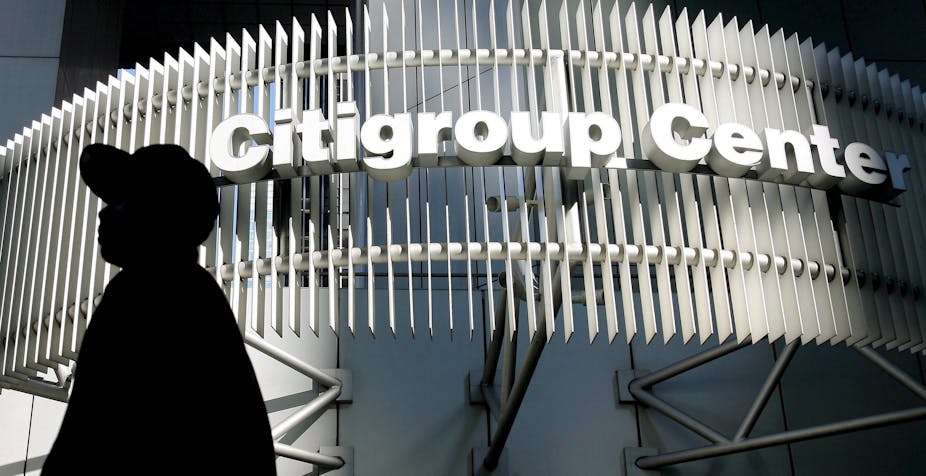The US Securities and Exchange Commission (SEC) has chalked up what appears at first glance to be another high-profile success in its prosecution of the strategies used by investment banks to profit from the sale of complex financial products.
Without admitting guilt or liability, investment bank Citigroup has agreed to pay a $285 million fine following a civil fraud case brought by the SEC.

The agency argued that the bank misled those who had invested in a complex derivative deal by simultaneously betting that the transaction would collapse in value through its own proprietary trading platform.
“Securities laws demand that investors receive more care and candour than Citigroup provided to these CDO investors,” said Robert Khuzami, the Director of Enforcement at the SEC.
Goldman Sachs and JP Morgan
Earlier this year two other major investment banks settled similar litigation. Goldman Sachs agreed to pay a fine of $554 million. JP Morgan settled its case by paying a fine of $153.6 million.
In both cases, the banks failed to disclose that an outside investor - who was betting against the CDO - had played a key role in choosing the securities offered to investors.
In the Citigroup case, it was the bank itself that had chosen the referent securities.
It outsourced the management of the transaction to a unit of Credit Suisse, which served as the collateral manager, giving the illusion of an arms-length transaction.
Indication of change?
It remains an open question whether the management of these cases — or indeed the SEC’s general approach to enforcement — presents evidence of the possibility of substantive change in either the internal governance or external policing of Wall Street.

Although in each case the bank committed to remedial action to improve compliance, in none did the SEC seek to appoint an external monitor.
Stark contrast
The decision not to mandate ongoing external review of internal compliance processes is linked to concern about regulatory overreach.
Negotiated prosecutions of this type has come in for criticism about the lack of accountability governing how and why such intrusions are warranted.
In part, however other factors are at play, including greater compliance imposed as a consequence of the passage of the Dodd-Frank Wall Street Reform and Consumer Protection Act (2010).
But the rush to settle may, however, create the illusion of justice.
Each settlement is subject to judicial approval - but this is by no means guaranteed, as illustrated by a recent case relating to a claim that Bank of America misled investors over executive bonus payments within Merrill Lynch.
In that case, the US Federal judge, Jed Rakoff, described the proposed settlement as “a contrivance designed to provide the SEC with the facade of enforcement and the management of the bank with a quick resolution of an embarrassing inquiry”.
Judge Rakoff reluctantly signed off, citing judicial restraint. He made no secret of his disdain, describing the settlement as “half-baked justice at best”.
This judicial scepticism plays into a growing belief that the operation of the CDO market — and its corollary, the Credit Default Swap (CDS) — was and remains inherently skewed in favour of those packaging complex financial products.
Institutional investors have long recognised that the protection of legitimate self-interest requires the threat of private enforcement action.

Cases filed against Credit Suisse, Merrill Lynch, UBS and Deutsche Bank - whose general counsel for the Americas at the time, Robert Khuzami, is now director of enforcement at the SEC - suggest significant ethical shortcomings and potential illegalities in the management of conflicts of interest across the entire industry.
In that respect, the settlement between Citigroup and the SEC changes little.
Without apologising or expressing regret, Citigroup released a statement in which it stated: “we are pleased to put this matter behind us and are focused on contributing to the economic recovery, serving our clients and growing responsibly.
"Since the crisis, we have bolstered our financial strength, overhauled the risk management function, significantly reduced risk on the balance sheet and returned to the basics of banking.”
What constitutes the basics of banking is far from resolved. The core conflict remains the dominance of proprietary trading within operating models.
Volcker Rule
The Dodd-Frank Act has mandated limitations in a section known colloquially as the “Volcker Rule” after former Federal Federal Reserve chairman, Paul Volcker.
The Volcker Rule calls for restraints to the capacity of regulated banking entities to engage in proprietary trading or circumvent these restrictions through investing in private equity and hedge funds.
It calls on the SEC to conduct a study and release proposed rules on how this would operate in practice.
The settlements dovetail with the release of these detailed rules earlier this month. While allowing partial exceptions for market-making purposes, they significantly restrain the banks in circumstances where there is an identifiable conflict of interest or involves high-risk assets or trading strategies.
Moreover, the rules mandate banking entities to create a compliance program that is subject to external supervisory oversight.
The banks have until January 13 to make submissions on the proposed rule. Ongoing litigation would have significantly reduced their bargaining position.
With the SEC cases now closed, the bargaining is likely to intensify. Wall Street reform is nowhere near complete.

